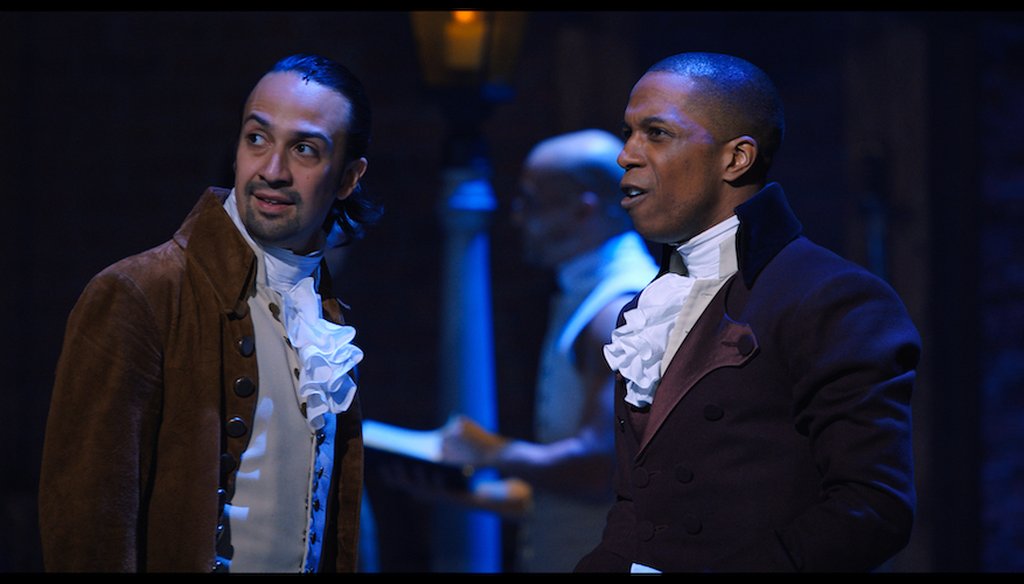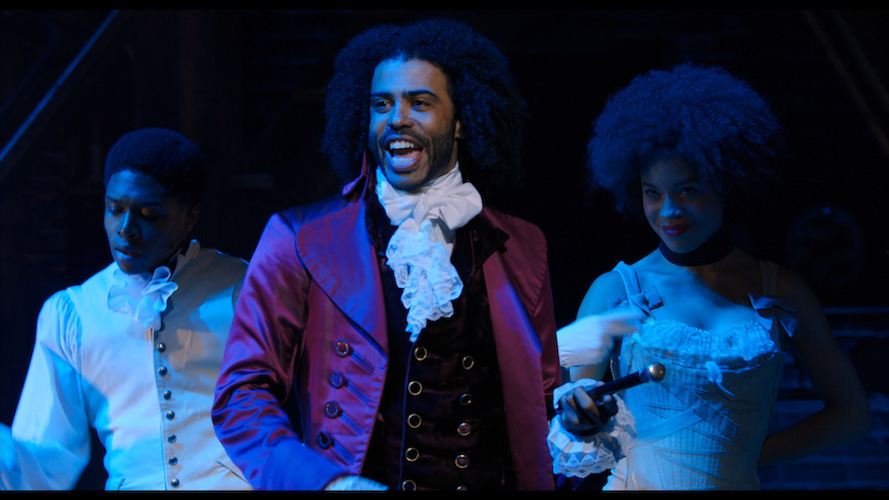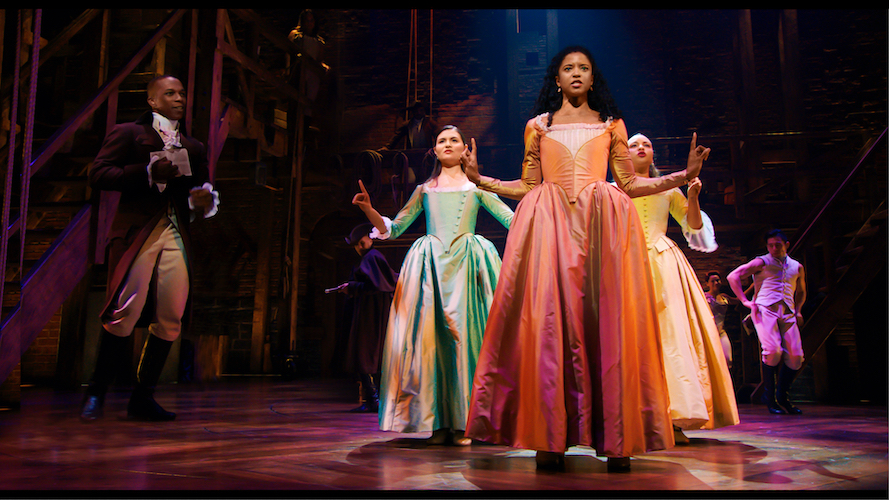Stand up for the facts!
Our only agenda is to publish the truth so you can be an informed participant in democracy.
We need your help.
I would like to contribute

Lin-Manuel Miranda as Alexander Hamilton and Leslie Odom Jr. as Aaron Burr in “Hamilton,” the filmed version of the Broadway musical. (Disney+)
If Your Time is short
-
“Hamilton” the musical is largely faithful to Alexander Hamilton’s life, with a few events transposed in time and some details changed for dramatic license.
-
Some historians have said the musical over-glorifies Hamilton by exaggerating his antislavery credentials and downplaying some of his less popular viewpoints.
-
Spoiler alert! This story reveals many key plot details of “Hamilton.”
Editor's note: Have you ever wondered if the movie you just saw — that claimed to be based on a real story or historical events — was really accurate? So have we. We want to help you sort out the facts from the dramatic liberties. (We've also fact-checked BlacKkKlansman, The Post, Darkest Hour and Dunkirk.)
The smash-hit Broadway musical "Hamilton" is making its move to the TV screen, bringing Lin-Manuel Miranda’s hip-hop biography of Alexander Hamilton to a new audience.
The tale of the "$10 Founding Father without a father" has inspired years of sell-out crowds at theaters across the country. The show, which Miranda famously began writing after reading Ron Chernow’s biography, chronicles Hamilton’s ascension to the forefront of American history.
The show is startlingly faithful to Hamilton’s life. It draws heavily — and sometimes verbatim — from his writings. But some events are transposed in time, some characters take on roles played by others in real life, and some details have been changed for dramatic license.
The biggest controversy we found among historians is a debate over whether Miranda’s "Hamilton" is too kind to its protagonist.
Miranda has often described his work as "the story of America then, told by America now." But even some scholars who say they admire Miranda’s multiracial cast — and the catchy songs they sing — have weighed in on whether the play’s largely heroic portrayal of Hamilton is accurate.
At the least, the musical has got people talking about Hamilton, his legacy and the revolutionary era. That conversation is bound to continue as the Broadway hit migrates to the TV screen and becomes available on Disney+ beginning July 3.
"‘Hamilton’ the musical should not be taken as the last word on these topics, and certainly not as the only word," said Todd Estes, professor of history at Oakland University. "But if the musical were the only perspective on the events of Hamilton's career that most people got, the version portrayed on stage is actually pretty good and could be a lot worse."
Below, we’ve compiled a non-exhaustive list of inaccuracies in "Hamilton," big and small. (We reached out to Miranda and Chernow but did not hear back.)
On race and Hamilton’s position toward slavery
Some historians say Miranda’s musical inflates Hamilton’s antislavery credentials, painting him as a "revolutionary manumission abolitionist" when, they say, he was less progressive on the issue of slavery in real life.
"It is great theater and bad history," said David Waldstreicher, a historian at the Graduate Center at the City University of New York, who argued in one of a collection of essays on "Hamilton" that the musical is part of a movement that over-glorifies the Founding Fathers.
The musical’s Hamilton celebrates John Laurens’ dream of building "the first Black battalion" and says, "We’ll never be free until we end slavery." Hamilton’s wife, Elizabeth Schuyler, says in the play's final song that he "could have done so much more" toward ending slavery had he lived longer.
In reality, Hamilton may not have been as ardent an abolitionist as the play makes him out to be. He was a founder of the New York Manumission Society, an anti-slavery group, but he did not seriously propose the total abolition of slavery, said Michael Newton, a historian and author of several books on Hamilton and the founding era.
"The most important error is the flat-out exaggeration of abolitionism," Waldstreicher said. In his essay, co-authored by the University of Missouri’s Jeffrey Pasley, Waldstreicher wrote that the real-life Hamilton "wasn’t an antislavery activist or a ‘revolutionary’ in that sense."
Hamilton propped up several Federalist slaveholders as presidential candidates, Waldstreicher and Pasley wrote. Other historians noted that Hamilton’s father-in-law owned slaves, and that Hamilton may have owned at least two slaves himself.
When slavery and race do come up in the musical, they do so "primarily to establish Hamilton’s ‘goodness’ for modern audiences," said Harvard University’s Annette Gordon-Reed in an essay for the National Council on Public History.
Gordon-Reed, who said she loved the musical and regularly listens to its soundtrack, was responding to an essay in the journal The Public Historian by Lyra D. Montiero, an assistant professor of American studies and history at Rutgers University, Newark.
Montiero took issue with Miranda’s decision to employ a predominantly Black and Latino cast, a move that has drawn both praise and criticism. The casting, she wrote, covers up for the fact that the "role of people of color in the Revolution itself is silenced."
"Despite the proliferation of Black and brown bodies onstage, not a single enslaved or free person of color exists as a character in this play," she wrote. There’s one exception, she noted: a chorus member briefly assumes the role of Sally Hemings, the biracial woman born into slavery under Thomas Jefferson who is believed to have had a sexual relationship with him.
Chernow, who described Hamilton as an "uncompromising abolitionist" in his biography, told the New York Times that the casting itself effectively writes non-white people into the Founding Fathers’ story. Daveed Diggs, who plays both Thomas Jefferson and the Marquis de Lafayette, said he "walked out of the show with a sense of ownership over American history."
Historians like Montiero have argued that the play could have also featured the "thousands of people of color (who) participated in the war" as soldiers, groomsmen and in other capacities. It omits the stories of Crispus Attucks, the Black man killed during the Boston Massacre, and Cato, who was born into slavery but worked as an anti-British spy alongside Hamilton’s friend Hercules Mulligan.
On the Reynolds Pamphlet
Hamilton’s decision to publish an explainer detailing his affair with Maria Reynolds is a turning point in the musical — and based on a real historical event. The musical quotes directly from the actual "Reynolds Pamphlet," with some language updated for clarity.
As in the play, the real-life Hamilton confessed to three men that he was guilty not of illegal financial speculation, but of paying hush money to James Reynolds, who extorted Hamilton under threat of publicizing the affair.
But in reality, it wasn’t Jefferson, Aaron Burr and James Madison who confronted Hamilton. It was House Speaker Frederick Muhlenberg, Rep. Abraham Venable of Virginia and future President James Monroe.
Hamilton released the tell-all "Reynolds Pamphlet" years later, after a journalist published details of the affair and made accusations of what he, too, suspected was illegal speculation.
In the musical, Hamilton’s revelations prompt his wife Elizabeth Schuyler to sing about burning her letters in order to "let future historians wonder how Eliza reacted when you broke her heart."
Chernow didn’t explicitly connect the lack of letters from Schuyler to the Reynolds Pamphlet. He wrote in his biography that she "apparently destroyed her own letters and tried to expunge her presence from the history books," but he didn't say when she got rid of them or why.
In "Hamilton: The Revolution," a book Miranda co-authored about the musical, he said he had "enormous freedom" with this scene because "Eliza’s response is lost in time."
On Thomas Jefferson and other Founding Fathers

Daveed Diggs performs as Thomas Jefferson in "Hamilton," the filmed version of the Broadway musical. (Disney+)
Jefferson is believed to have been more mild-tempered than "Hamilton" lets on — a writer more than a speaker. The musical alters some events to paint him as a foil to Hamilton.
Between Jefferson’s return anthem "What Did I Miss?" and Hamilton’s claim in "Cabinet Battle #1" that "we almost died in a trench while you were off getting high with the French," the musical gives the impression that Jefferson waited out the Revolutionary War overseas.
Jefferson did not fight in the war as a soldier. He was selected as a delegate to the Second Continental Congress in 1775 and helped draft the Declaration of Independence for adoption in 1776. He served as governor of Virginia from 1779 to 1781.
It wasn’t until 1784 that Jefferson left for Europe, where he eventually replaced Benjamin Franklin as the U.S. minister to France.
Jefferson didn’t step down as secretary of state "so he (could) run for president," either, despite what President George Washington’s character says in "One Last Time."
In reality, he resigned in 1793, three years before the 1796 election, when he was elected vice president.
The musical’s reduction of Madison to a Jefferson sidekick also results in a portrayal that is "greatly distorted," said Estes, the Oakland University professor.
"In actuality, Madison was a giant," Estes said. "Madison was absolutely an equal partner with Jefferson and stood on the same level of historical significance as Hamilton and Jefferson."
On the election of 1800
The musical’s rivalry between Hamilton and Burr peaks after the election of 1800. Hamilton sways the delegates to elect Jefferson with a late, tie-breaking "endorsement" that lifts Jefferson over Burr "in a landslide" and inspires Burr to challenge Hamilton to a duel.
In reality, however, Jefferson did not win solely because of Hamilton, nor was it a landslide.
The election of 1800 saw the Democratic-Republican Party push Jefferson for president and Burr for vice president in a bid to unseat President John Adams. The voting process was different back then. Electors in the Electoral College got two votes. The recipient of the most votes would become president, and the runner-up would become vice president.
Jefferson and Burr received the same number of votes, resulting in a tie that sent the decision to the House of Representatives. Hamilton lobbied the House Federalists to back Jefferson, but he wasn’t the deciding "vote," as the musical suggests.
"James Bayard of Delaware is the only person who had that kind of influence, and he didn't listen to Hamilton," wrote Nancy Isenberg, professor of history at Louisiana State University, in a journal article that called Miranda’s depiction of the election "distorted beyond recognition."
It also wasn’t the so-called "endorsement" that inspired the Hamilton-Burr duel. According to the National Archives, Burr challenged Hamilton after Hamilton campaigned and allegedly made disparaging remarks against him during Burr’s run to become New York’s governor in 1804.
The two did sign their letters "A.Hamilton" and "A.Burr."
Other historical inaccuracies or exaggerations

Phillipa Soo as Eliza Hamilton, Renee Elise Goldsberry as Angelica Schuyler and Jasmine Cephas Jones as Peggy Schuyler in "Hamilton," the filmed version of the Broadway musical. (Disney+)
Aaron Burr: "You punched the bursar."
Song: "Aaron Burr, Sir"
Fact-check: Hamilton’s character describes punching the person who "handles the financials" at Princeton. But in his book on the musical, Miranda said the line was a "historical leap" that made for a good rhyme. The real-life Hamilton had a disagreement with Princeton’s president over his desire to graduate early, according to Chernow’s biography.
Miranda also wrote that the dialogue between Hamilton and Burr was a "fictional first meeting." Other characters in the scene, including the Marquis de Lafayette, could not have met Hamilton that early. "Lafayette was not in America when Hamilton arrived," Newton, the Hamilton historian, said.
Aaron Burr: "Martha Washington named her feral tomcat after him."
Alexander Hamilton: "That’s true!"
Song: "A Winter’s Ball"
Fact-check: The tomcat story suggests that Hamilton was a womanizer. It appears in multiple biographies, according to the Associated Press. But the story is actually in dispute.
Miranda wrote in his book on the musical that it was "most likely a tale spread by John Adams later in life," while Newton traced it to a satirical letter written by someone identified as Captain Smythe.
Angelica Schuyler: "My father has no sons so I’m the one who has to social climb for one."
Song: "Satisfied"
Fact-check: Angelica Schuyler Church had several brothers, a fact that Miranda has since said he "forgot" while writing the musical. She was also married by the time that Hamilton came into her life, although the two did exchange frequent letters.
The company: "It’s the 10 duel commandments."
Song: "The Ten Duel Commandments"
Fact-check: An American "code duello" did exist, according to PBS’s American Experience. But the 1777 code had more than 10 rules — it had 25. Miranda wrote in a Genius annotation that he was inspired by "Ten Crack Commandments," a rap song by the Notorious B.I.G.
Miranda also altered other details of the duels depicted in "Hamilton." For example, Burr was not present during the duel between Laurens and Charles Lee, according to an account by Hamilton and Maj. Evan Edwards, Lee’s second. It’s also not clear that Washington was as upset by the duel as the musical shows.
Aaron Burr: "Talks for six hours! The convention is listless!"
Song: "Non-Stop"
Fact-check: Hamilton did speak for roughly six hours at the Constitutional Convention, and he did propose "his own form of government," as the musical says.
The missing context is that "Hamilton famously advocated a monarchy in a speech his colleagues admired but ignored," Waldstreicher and Pasley wrote in their essay.
Generally speaking, Hamilton had a "serious anti-democratic bent" that was "played down" in the musical, Estes said. "The immigrant trope is used to help make Hamilton more a ‘man of the people’ than he ever was historically," he said.
Alexander Hamilton: "Do you support this Constitution? … Then defend it."
Song: "Non-Stop"
Fact-check: There’s no evidence that Hamilton invited Burr to contribute to the Federalist Papers, a series of essays arguing in support of the U.S. Constitution. In Miranda’s book on the musical, he wrote that this was a "fictional scene." Only Madison and John Jay contributed to the effort, while Gouvernuer Morris declined Hamilton’s invitation to join it.
Thomas Jefferson: "If New York’s in debt, why should Virginia bear it? Uh! Our debts are paid, I’m afraid. Don’t tax the South cuz we got it made in the shade."
Song: "Cabinet Battle #1"
Fact-check: It’s not true that the Southern states had paid off all their post-war debts when Hamilton proposed a plan to let the federal government assume them. The funding act passed as part of the Compromise of 1790 authorized the assumption of $21.5 million in debts that were owed by all 13 states, including the Southern states.
Aaron Burr: "Adams fires Hamilton … Hamilton publishes his response."
Song: "The Adams Administration"
Fact-check: Hamilton resigned as Treasury Secretary in 1795, before Adams became president. Adams took over the presidency two years later, in 1797. Hamilton blasted Adams in a letter dated Oct. 24, 1800.
Alexander Hamilton: "I have never agreed with Jefferson once."
Song: "The Election of 1800"
Fact-check: Hamilton and Jefferson agreed on some things, such as the establishment of the United States Military Academy at West Point. Along with Madison, the two famously struck a deal over dinner that led to the Compromise of 1790. Jefferson and Madison agreed to let the federal government assume state debts in exchange for moving the capital to Washington, D.C. The dinner is detailed in the musical’s "The Room Where it Happens."
Our Sources
Lin-Manuel Miranda and Jeremy McCarter, "Hamilton: The Revolution," 2016
Spotify, "Hamilton Soundtrack (Full Musical)," accessed June 30, 2020
Ron Chernow, "Alexander Hamilton," 2004
National Archives, Hamilton Papers, accessed June 30, 2020
National Archives, "From Alexander Hamilton to Elizabeth Hamilton, [4 July 1804]," accessed June 30, 2020
National Archives, "To Alexander Hamilton from James Reynolds, 15 December 1791," accessed June 30, 2020
National Archives, "Printed Version of the 'Reynolds Pamphlet', 1797," accessed June 30, 2020
National Archives, "Tally of Electoral Votes for the 1800 Presidential Election," accessed June 30, 2020
National Archives, "Enclosure: Charles D. Cooper to Philip Schuyler, [23 April 1804]," accessed June 30, 2020
National Archives, "From Alexander Hamilton to Oliver Wolcott, Junior, 16 December 1800," accessed June 30, 2020
National Archives, "Introductory Note: The Duel Between Aaron Burr and Alexander Hamilton, [18 June–23 October 1804]," accessed June 30, 2020
National Archives, "Statement on Impending Duel with Aaron Burr, [28 June–10 July 1804]," accessed June 30, 2020
National Archives, "From Alexander Hamilton to Aaron Burr, 22 June 1804," accessed June 30, 2020
National Archives, "To Alexander Hamilton from Aaron Burr, 22 June 1804," accessed June 30, 2020
National Archives, "From Alexander Hamilton to Aaron Burr, 20 June 1804," accessed June 30, 2020
National Archives, "To Alexander Hamilton from Aaron Burr, 21 June 1804," accessed June 30, 2020
National Archives, "Account of a Duel between Major General Charles Lee and Lieutenant Colonel John Laurens, [24 December 1778]," accessed June 30, 2020
National Archives, "Letter from Alexander Hamilton, Concerning the Public Conduct and Character of John Adams, Esq. President of the United States, [24 October 1800]," accessed June 30, 2020
Library of Congress, "Full Text of The Federalist Papers," accessed June 30, 2020
Library of Congress, "An Act making provision for the [payment of the] Debt of the United States," accessed June 30, 2020
Library of Congress, "Thomas Jefferson Papers, 1606 to 1827," accessed June 30, 2020
Library of Congress, "Thomas Jefferson to George Washington, December 31, 1793, Resignation as Secretary of State," accessed June 30, 2020
The White House, "Thomas Jefferson," accessed June 30, 2020
The White House, "John Adams," accessed June 30, 2020
PBS, "Code Duello: The Rules of Dueling," accessed June 30, 2020
PBS, "Philip Hamilton (1782-1801)," accessed June 30, 2020
PBS, "The Dinner Table Bargain, June 1790," accessed June 30, 2020
United States Military Academy at West Point, "A Brief History of West Point," accessed June 30, 2020
Discovering Hamilton, "Alexander Hamilton: The Tomcat Fully Refuted," accessed June 30, 2020
University of Virginia Library, "Angelica Schuyler Church," accessed June 30, 2020
History.com, "Thomas Jefferson," June 24, 2020
The Associated Press, "Historians irked by musical ‘Hamilton’ escalate their duel," Feb. 4, 2019
History.com, "The Scandal That Ruined Alexander Hamilton’s Chances of Becoming President," Aug. 20, 2018
DC Metro Theater Arts, "Who Were the Schuyler Sisters? Fact and Fiction in ‘Hamilton’," July 10, 2018
Smithsonian Magazine, "The Issue on the Table: Is "Hamilton" Good For History?," May 30, 2018
Renee C. Romano and Claire Bond Potter, "Historians on Hamilton: How a Blockbuster Musical Is Restaging America's Past Paperback," May 9, 2018
Journal of the Early Republic, "'Make 'em Laugh' Why History Cannot Be Reduced to Song and Dance," 2017
Journal of the Early Republic, "Will the Real Alexander Hamilton Please Stand Up?," 2017
Jonathan Hennessey, "A Comprehensive Guide to Historical Inaccuracies in Hamilton the Musical," Aug. 4, 2017
Vox, "The intense debates surrounding Hamilton don't diminish the musical — they enrich it," Sept. 13, 2016
The Associated Press, "Did Martha Washington really name a cat after Alexander Hamilton?" July 7, 2016
The New York Times, "What ‘Hamilton’ Forgets About Hamilton," June 10, 2016
The New York Times, "‘Hamilton’ and History: Are They in Sync?," April 10, 2016
National Council on Public History, "Hamilton: The Musical: Blacks and the founding fathers," April 6, 2016
The Public Historian, "Review Essay: Race-Conscious Casting and the Erasure of the Black Past in Lin-Manuel Miranda’s Hamilton," Feb. 2016
Vox, "The real-life election of 1800 was even wilder than Hamilton the musical lets on," Nov. 28, 2015
Genius on YouTube, "Hamilton: Lin-Manuel Miranda On The Play's Historical Inaccuracies," Nov. 2, 2015
The Atlantic, "How Lin-Manuel Miranda Shapes History," Sept. 29, 2015
The Wall Street Journal, "‘Hamilton’ Roles Are This Rapper’s Delight," July 7, 2015
National Archives, "The Compromise of 1790," May 31, 2015
University of Virginia Library, "A Guide to the Angelica Schuyler Church Papers," 2015
History.com, "Aaron Burr slays Alexander Hamilton in duel," Nov. 24, 2009
History.com, "Gouverneur Morris," Nov. 9, 2009
Email interview with Todd Estes, professor of history at Oakland University, June 29, 2020
Email interview with David Waldstreicher, professor of history at the Graduate Center at the City University of New York, June 29, 2020
Email exchange with Andrew Shankman, professor of history at Rutgers University, Camden, and editor of the "Journal of the Early Republic," June 29, 2020
Email interview with Michael Newton, historian and author of several books on Alexander Hamilton, the American Revolution and the founding era, June 26, 2020






























